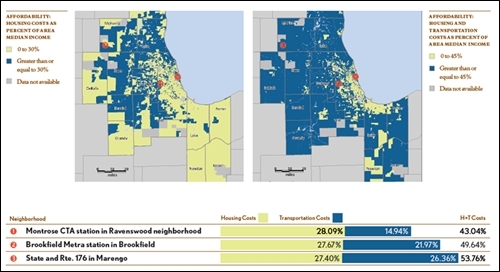 By Stefanie Shull and Adam Mays, Center for Neighborhood Technology
By Stefanie Shull and Adam Mays, Center for Neighborhood Technology - April 2, 2012

Adam Mays, CNT
Housing counselors know that their clients need to be prepared for the full cost of owning a home, which includes taxes, utilities, maintenance costs, and other expenses in addition to the mortgage payment. However, some may not have considered the impact that transportation costs have on a family budget, or how these costs are related to where that family lives. Transportation costs represent the second-largest and fastest-growing expense for the typical American family, and they can vary widely based on the location of a home, the size of the household, household income, and other factors.
The Center for Neighborhood Technology (CNT), a Chicago-based nonprofit that provides urban sustainability solutions, created the Housing and Transportation (H+T®) Affordability Index to reveal what it costs to get around in neighborhoods across the country. The Index shows that transportation costs vary between and within regions depending on neighborhood characteristics. People who live in location-efficient neighborhoods—compact, mixed-use areas with convenient access to jobs, services, transit, and amenities—tend to have lower transportation costs. People who live in location inefficient places that require automobiles for most trips are more likely to have high transportation costs.
The differences from one location to another can make a big difference in a family’s ability to service a mortgage. On the left, 7 in 10 neighborhoods (69%) in the Chicago region are considered affordable for the region’s typical household when using the conventional measure. On the right, affordability shrinks to 4 in 10 neighborhoods (42%) when using the expanded view of affordability. This produces a net loss of 1,718 neighborhoods where that typical regional family could afford to live.

CNT created an easy-to-use tool called Abogo to put this information in the hands of individuals seeking to make a decision about where to live. Now when families are evaluating their options, they can take into account not only the amount of the rent or mortgage payments and the number of bedrooms they need, but also the impact of the neighborhood on their transportation costs.

"As housing counselors, our real job is to paint a realistic picture of homeownership and add to our communities by expanding the knowledge of our clients. The data that CNT provides regarding transportation costs is just one more tool that we have chosen to use in this mission.”
–Ron Chavez, The Housing Trust, Santa Fe, New Mexico
Abogo helps clients discover what it costs a typical family in a particular neighborhood to get around—not just for the commute to work, but for all those little trips that make up the bulk of our time in the car: shopping runs, picking up the kids, medical appointments, and so on. You can also use Abogo to compare the estimated transportation cost at an address to the regional average and to find the estimated carbon impact from driving.
CNT recommends that housing counselors use these tools to give clients a full understanding of the costs associated with living at a particular address. You can use Abogo to compare the average transportation costs at different addresses and determine a combined housing and transportation cost estimate for a client, making sure that a home is truly affordable and sustainable for a family. Figuring out transportation costs is a key part of assessing the total cost of owning a home.
CNT also offers a training guide to housing counselors on how to use the H+T Index in their work. It offers the tools and knowledge to help first-time homebuyers and other clients consider how they can control transportation costs while saving for a home, as part of their home-buying decision and to help them stay in their home over the long term. The guide includes talking points for use in one-on-one meetings, a take-home handout for clients, and two slides that can be used in workshop settings. We collaborated with The Housing Trust of Santa Fe, New Mexico, and the City of El Paso, Texas, to develop these materials, and we are currently working to make the guide available in more areas (for more information, contact Stefanie Shull at sshull@cnt.org.)
CNT is committed to creating cities that use resources wisely and are affordable for all. Working with housing counselors to provide families the information they need to understand the transportation cost implications of where they choose to live is a key strategy in meeting that commitment.
Stefanie Shull is a transportation and community development policy analyst at CNT. Adam Mays is a social ventures associate and manages CNT’s Abogo site. http://www.cnt.org/